Comprehensive Guide to Garden Maintenance in Chigwell

Maintaining a beautiful garden in Chigwell requires dedication, knowledge, and the right techniques. Whether you're a seasoned gardener or a beginner, understanding the specific needs of your garden can make all the difference. In this article, we'll explore the essential aspects of garden maintenance tailored to Chigwell's unique climate and soil conditions.
Chigwell, located in the heart of Essex, boasts a temperate climate that is ideal for a wide variety of plants. However, to achieve a thriving garden, it's crucial to implement effective maintenance strategies that cater to this environment. From soil preparation to plant selection, each step plays a vital role in ensuring your garden flourishes throughout the year.
One of the first steps in garden maintenance is assessing your garden's current state. This includes evaluating soil quality, checking for pests, and identifying any areas that may need special attention. Regular assessments help in early detection of potential issues, allowing you to address them promptly and maintain the health of your garden.
Soil Preparation and Health
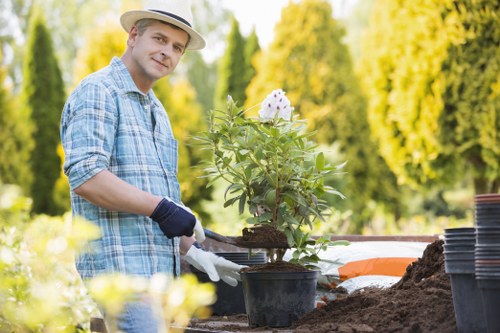
Healthy soil is the foundation of a thriving garden. In Chigwell, the soil typically consists of a mix of clay and loam, which can retain nutrients effectively but may require amendment to improve drainage and aeration.
**Amending the soil** with organic matter such as compost or well-rotted manure can enhance its structure. This not only improves drainage but also increases the soil's ability to retain essential nutrients, providing a robust environment for plant growth.
Regularly testing your soil's pH levels is also essential. Most garden plants prefer a slightly acidic to neutral pH. If your soil is too acidic or alkaline, adjusting it with lime or sulfur can create optimal conditions for your plants.
Additionally, incorporating cover crops during the off-season can help maintain soil fertility. Cover crops like clover or rye prevent soil erosion, suppress weeds, and add organic matter back into the soil.
Plant Selection and Placement
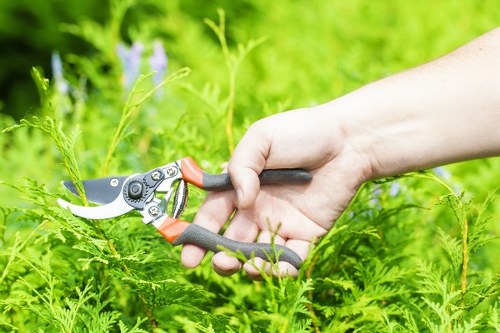
Choosing the right plants is critical for successful garden maintenance in Chigwell. Opting for native plants or those well-suited to the local climate can reduce maintenance efforts and increase resilience against pests and diseases.
Consider the following when selecting plants:
- Climate suitability: Ensure the plants can thrive in Chigwell's temperate climate.
- Soil compatibility: Match plants to your soil type and pH levels.
- Sunlight requirements: Place plants according to their sunlight needs to maximize growth.
- Watering needs: Group plants with similar watering requirements to simplify maintenance.
Proper placement of plants also enhances the aesthetic appeal and functionality of your garden. For instance, taller plants can be positioned at the back of garden beds, while shorter plants can be placed in front, creating depth and visual interest.
Seasonal Planting Tips
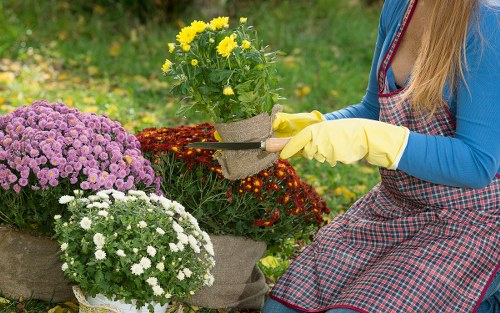
Seasonal planting ensures a continuous display of blooms and greenery throughout the year. In Chigwell, different seasons offer varying opportunities for planting:
- Spring: Ideal for planting perennials, bulbs, and vegetables.
- Summer: Focus on maintaining established plants and harvesting crops.
- Autumn: Plant trees and shrubs, and prepare the garden for winter.
- Winter: Protect sensitive plants and plan for the upcoming growing season.
By aligning your planting schedule with the seasons, you can optimize growth and ensure your garden remains vibrant all year round.
Regular Maintenance Practices
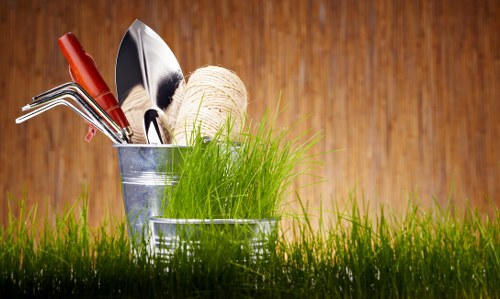
Consistent maintenance is key to preventing issues and promoting plant health. Here are some essential maintenance practices for gardens in Chigwell:
- Watering: Ensure plants receive adequate water, especially during dry spells. Early morning watering reduces evaporation and the risk of fungal diseases.
- Weeding: Regularly remove weeds to prevent competition for nutrients and water.
- Pruning: Trim overgrown branches and dead foliage to encourage healthy growth and improve air circulation.
- Fertilizing: Apply fertilizers as needed to replenish soil nutrients and support plant development.
- Pest Control: Monitor for pests and implement eco-friendly control methods to protect your plants.
Implementing these maintenance practices can significantly enhance the health and appearance of your garden, making it a delightful space to enjoy.
Seasonal Maintenance Tasks

Different seasons bring unique maintenance challenges and opportunities. Adapting your maintenance routine to the changing seasons ensures your garden remains in top condition.
Spring: Focus on planting new seeds, fertilizing, and preparing garden beds for new growth.
Summer: Maintain consistent watering schedules, monitor for pests, and prune as necessary.
Autumn: Clean up fallen leaves, plant seasonal bulbs, and prepare perennials for winter.
Winter: Protect sensitive plants from frost, plan next year's garden, and perform necessary repairs on garden structures.
Tools and Equipment for Garden Maintenance
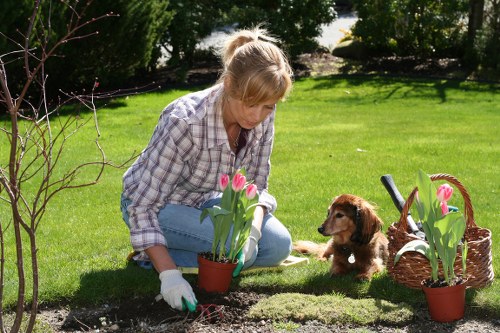
Having the right tools and equipment can make garden maintenance more efficient and enjoyable. Here are some essential tools for maintaining your Chigwell garden:
- Pruning Shears: For trimming and shaping plants.
- Garden Fork: Useful for turning soil and aerating garden beds.
- Hand Trowel: Ideal for planting, weeding, and other small tasks.
- Watering Can or Hose: Essential for providing plants with adequate moisture.
- Rake: Helps in collecting leaves and smoothing soil surfaces.
Investing in high-quality tools not only enhances your efficiency but also ensures longevity and reliability when performing various gardening tasks.
Advanced Equipment for Larger Gardens
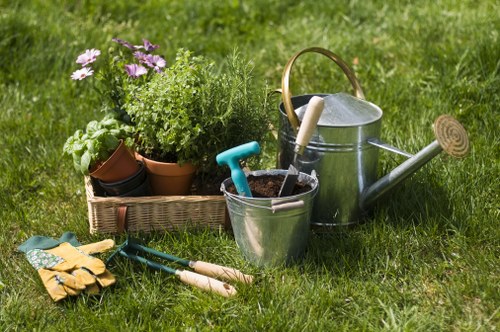
For those with larger gardens, advanced equipment can significantly reduce the time and effort required for maintenance:
- Lawn Mower: Keeps your lawn neat and healthy.
- Hedge Trimmer: Streamlines the process of shaping hedges and shrubs.
- Leaf Blower: Quickly gathers leaves and debris from large areas.
- Wheelbarrow: Facilitates the transportation of soil, plants, and tools.
Using the right equipment for the size of your garden can improve the efficiency of your maintenance routine and help achieve better results.
Professional Garden Maintenance Services in Chigwell

While DIY garden maintenance can be fulfilling, enlisting the help of professional garden maintenance services in Chigwell can offer numerous benefits:
- Expertise: Professionals bring extensive knowledge and experience to address complex gardening challenges.
- Time-Saving: Outsourcing maintenance tasks frees up your time to enjoy your garden rather than work on it.
- Customized Care: Services can be tailored to meet the specific needs of your garden, ensuring optimal health and appearance.
- Access to Advanced Tools: Professionals typically have access to specialized equipment that can enhance maintenance efficiency.
Hiring a professional garden maintenance service ensures that your garden receives the attention and care it deserves, leading to a more beautiful and well-maintained outdoor space.
Choosing the Right Service Provider

Selecting a reputable garden maintenance service in Chigwell involves considering several factors:
- Experience: Look for providers with a proven track record in garden maintenance.
- Services Offered: Ensure the service offers the specific maintenance tasks you require.
- Customer Reviews: Positive feedback and testimonials can indicate reliability and quality of service.
- Pricing: Compare quotes to find a service that offers good value for your investment.
Taking the time to research and choose the right provider will ensure your garden maintenance needs are met effectively and professionally.
Eco-Friendly Garden Maintenance Practices
Adopting eco-friendly maintenance practices not only benefits the environment but also promotes the health and sustainability of your garden. Here are some green practices to consider:
- Composting: Recycle garden waste into nutrient-rich compost to improve soil fertility.
- Organic Pest Control: Use natural remedies and beneficial insects to manage pests without harmful chemicals.
- Water Conservation: Implement rainwater harvesting and drip irrigation to reduce water usage.
- Sustainable Material Use: Choose eco-friendly materials for garden structures and pathways.
Integrating these sustainable practices into your garden maintenance routine fosters a healthy ecosystem and reduces your environmental footprint.
Benefits of Eco-Friendly Practices
Embracing eco-friendly garden maintenance offers several advantages:
- Healthier Plants: Organic practices enhance soil health, leading to stronger and more resilient plants.
- Environmental Impact: Reducing chemical use protects local wildlife and water sources.
- Cost Savings: Sustainable practices like composting and rainwater harvesting can decrease maintenance costs.
- Aesthetic Appeal: Eco-friendly gardens often feature diverse plant life and natural beauty.
By prioritizing sustainability, you create a garden that is not only beautiful but also harmonious with nature.
Common Challenges in Garden Maintenance
Maintaining a garden in Chigwell comes with its own set of challenges. Being aware of these potential issues can help you prepare and address them effectively:
- Pest Infestations: Common pests like aphids, slugs, and snails can damage plants if not managed promptly.
- Disease Management: Fungal and bacterial diseases can spread rapidly in gardens without proper sanitation.
- Weather Extremes: Unpredictable weather patterns, including heavy rains or droughts, can impact plant health.
- Weed Control: Aggressive weeds compete with desirable plants for resources, hindering growth.
Implementing proactive measures and regular monitoring can mitigate these challenges, ensuring your garden remains healthy and vibrant.
Preventative Measures for Common Issues
Taking preventative steps is essential in minimizing the impact of common garden challenges:
- Integrated Pest Management (IPM): Combine biological, cultural, and mechanical methods to control pests sustainably.
- Proper Plant Spacing: Ensures adequate air circulation, reducing the risk of diseases.
- Regular Sanitation: Remove dead plant material and debris to prevent disease and pest harboring.
- Mulching: Helps retain soil moisture, suppresses weeds, and improves soil quality.
By adopting these preventative measures, you can create a robust defense against common garden issues, maintaining a healthy and aesthetically pleasing garden.
Decorative Elements in Garden Maintenance
Incorporating decorative elements enhances the visual appeal and functionality of your garden. Thoughtfully placed features can create focal points, add texture, and provide areas for relaxation.
Popular decorative elements include:
- Garden Paths: Stone or gravel paths guide visitors through the garden and prevent soil compaction.
- Water Features: Fountains or ponds add a soothing auditory element and attract wildlife.
- Garden Lighting: Strategic lighting highlights plants and structures, extending the garden's usability into the evening.
- Seating Areas: Benches or pergolas provide spaces to enjoy the garden's beauty.
Integrating these elements thoughtfully can transform your garden into a captivating and inviting outdoor space.
Choosing the Right Decorative Features
Selecting decorative features that complement your garden's style and layout is crucial for a harmonious appearance:
- Style Consistency: Match decorative elements with the overall garden theme, whether it's modern, cottage, or formal.
- Functional Placement: Ensure features like seating areas and water elements are placed in locations that enhance both aesthetics and usability.
- Scale and Proportion: Choose decorations that are proportionate to the size of your garden to maintain balance.
- Material Selection: Opt for durable materials that withstand Chigwell's climate and require minimal maintenance.
Careful selection and placement of decorative features can elevate the beauty and functionality of your garden, making it a personal sanctuary.
Seasonal Garden Care in Chigwell
Each season presents unique opportunities and challenges for garden maintenance. Adapting your care routine to the changing seasons ensures your garden remains healthy and vibrant year-round.
Spring Care:
- Plant new flowers and vegetables.
- Fertilize and aerate the soil.
- Prune trees and shrubs before new growth starts.
Summer Care:
- Maintain consistent watering schedules.
- Deadhead spent blooms to encourage new growth.
- Manage pests and diseases promptly.
Autumn Care:
- Rake fallen leaves and compost them.
- Plant cover crops to enrich the soil.
- Prepare perennials for winter by adding mulch.
Winter Care:
- Protect sensitive plants from frost.
- Plan next year's garden layout.
- Clean and store garden tools properly.
Adapting to Chigwell's Climate
Chigwell's climate, characterized by mild winters and warm summers, allows for a diverse range of plants. However, it's essential to adapt your maintenance practices to these conditions:
- Water Management: Adjust watering schedules based on seasonal rainfall to prevent over or under-watering.
- Frost Protection: Use frost cloths or other protective measures for sensitive plants during unexpected cold spells.
- Heat Mitigation: Provide shade and adequate hydration for plants during the summer heat to prevent stress.
Understanding and responding to Chigwell's climate variations can enhance your garden's resilience and productivity.
Conclusion
Effective garden maintenance in Chigwell involves a combination of proper soil care, thoughtful plant selection, regular maintenance practices, and the incorporation of decorative elements. By adapting to the local climate and adopting sustainable practices, you can create a thriving and beautiful garden that serves as a personal oasis.
Whether you choose to undertake maintenance yourself or enlist the help of professionals, the key is consistency and attention to detail. Embrace the rhythms of the seasons, stay proactive in addressing challenges, and enjoy the rewards of a well-maintained garden.
Ready to transform your garden into a stunning masterpiece? Contact us today to book your garden maintenance service and experience the difference professional care can make.
